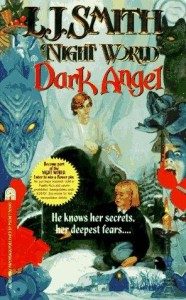I’ve pointed out before that the Night World books, so far, often have a touch of real life  conflict in them, under all the vampires and witches and true love. In Secret Vampire, Poppy and James have to learn how to be on their own in a world that almost certainly is dangerous to them. In Daughters of Darkness, Ash and Mary-Lynette have to learn to change their whole world view when fate plays a trick on them. In Spellbinder, Thea thinks her whole life is a set path before her, then sees it collapse around her.
conflict in them, under all the vampires and witches and true love. In Secret Vampire, Poppy and James have to learn how to be on their own in a world that almost certainly is dangerous to them. In Daughters of Darkness, Ash and Mary-Lynette have to learn to change their whole world view when fate plays a trick on them. In Spellbinder, Thea thinks her whole life is a set path before her, then sees it collapse around her.
These all mirror feelings that teens have as they move through high school and realize just how much they, and their world, will change once they no longer have the support (or demands) of school.
Of all the Night World books I think Dark Angel is the heaviest on this element. With Dark Angel Smith veers off from the world she’s been creating, or seems to. Gillian is a lost witch, something reader will figure out before the character does. This gives the whole book the feel of being almost completely outside the Night World series. The ties are important ones, but not obvious at first.
At the beginning of Dark Angel Gillian freezes to death in the cold woods. But she’s intercepted along the process of passing and given a second chance, and a guardian angel to help turn her life from something wasted into something worthy. Who doesn’t feel like they’ve done nothing important with their lives at some point?
With her angel’s help Gillian works to be important, as defined by her high school peers–yup, that means she gets a make over and becomes popular. But Gillian figures out pretty quick that being popular doesn’t mean being worthy. Gillian goes from the nobody kid with an alcoholic mother, to pretty, savvy popular lady, helped out a bit by a few spells. But her angel isn’t quite who he says he is, and her trust in him is very misplaced.
Dark Angel is as much about the process of maturing as any of the other books. Plus Gillian is not, in the beginning, a self-assured powerful person. She struggles with her expectations versus the reality of the world, which leads to the majority of the conflict in the book. Gillian wants to be special, wants to be popular, wants to be loved, wants her mom to not be alcoholic. But once she starts working toward these things she discovers that the reward isn’t always worth the work, and somethings can’t (or shouldn’t) be pushed.
Again Dark Angel is such an individual book that it’s hard to evaluate it against the others in the series so far. It reads like a side quest, and while enjoyable as its own story, it just feels so disconnected with the previous three (and the next two) that it’s hard to not be overlooked as a favorite-option in the scope of the Night World books.
In the end Smith avoids the tricks a lot of more recent authors use when having their heroes tempted by the dark side. She also (gladly) manages to make her characters stand out people with powers, but none of them suffer from super powered spechial snowflake-itis, meaning their powers always present a new set of challenges for them rather than lifting them in an artificial importance over everyone else in the world setting. This, if nothing else in the Night World books, makes for great reading.